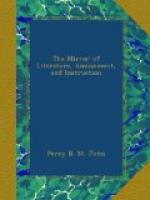D.P.
* * * * *
BAD ALE.
In the time of the Saxons, it was a custom in the city of Chester, that any person who brewed bad ale should either be placed in a ducking-chair, and plunged into a pool of muddy water, or, in lieu of that punishment, should forfeit four shillings.
D.P.
* * * * *
ANCIENT TRADESMEN.
In Domesday Book we find frequent mention of goldsmiths; and we know the Anglo-Saxons had their goldsmiths, silversmiths, and coppersmiths. Bowyers, or makers of cross-bows, are frequently mentioned—as are carpenters, potters, bakers, and brewers, the last of which were chiefly women. Both war and agriculture want the smith: hence his importance among the Saxons. They were free from all other services, on payment of a penny yearly for their forge. We also meet with butchers, barbers, embroiderers, saddlers, parchment-makers, and salt-makers.
D.P.
* * * * *
PHYSICIANS’ FEES.
In a book called Levamen Infirmi, written in 1700, the usual fees to physicians and surgeons at that time are thus stated:—“To a graduate in physic, his due is about 10s., though he commonly expects, or demands, 20s. Those that are only licensed physicians, their due is no more than 6s. 9d., though they commonly demand 10s. A surgeon’s journey is 12d. a mile, be his journey far or near. Ten groats to set a bone broke, or out of joint; and for letting of blood, 1s. The cutting off or amputation of any limb is 5l., but there is no settled price for the cure.”
D.P.
* * * * *
EVIL OMEN.
In the journals of the House of Commons, during the reign of Queen Elizabeth, appears the following entry:—“This day a black raven came into the House, which was considered as malum omen.”
D.P.
* * * * *
HENRY VIII. AND QUEEN KATHERINE.
The following letter was sent by Queen Katherine to Henry VIII., after she was put away by that prince, to make room for Anne Boleyn. It was written from Kimbolton, in Huntingdonshire, to which place Katherine repaired after the divorce. It is dated 29th January, 1536. The bull for the divorce, bearing date 1529, is to be found in the Life of Henry VIII., written by Lord Herbert of Cherbury, 1649.
J.F.
Gray’s Inn.




